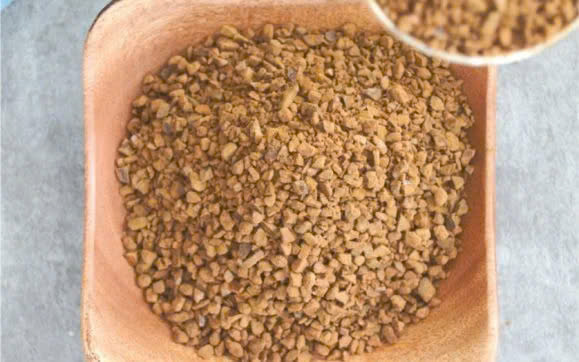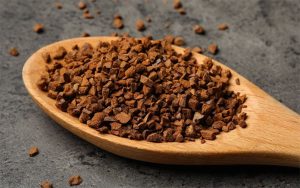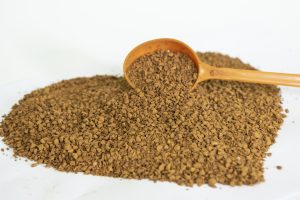
Freeze-dried Robusta coffee is gradually becoming a new trend in the coffee world, offering unique and convenient experiences for coffee lovers. In particular, freeze-dried Robusta coffee retains its characteristic strong and bold flavor, captivating those with a preference for assertive coffee. Let’s delve deeper into this special type of coffee.
1. What is Freeze-Dried Coffee?
Freeze-dried coffee is a premium instant coffee product processed by removing water at extremely low temperatures, typically below -40°C. This process helps to preserve the maximum aroma, natural flavor, and valuable compounds present in roasted and ground coffee beans. Compared to traditional heat-drying methods, freeze-drying delivers superior quality instant coffee.
For freeze-dried Robusta coffee, the raw material is high-quality Robusta coffee beans, meticulously harvested and processed. Thanks to the freeze-drying process, Robusta coffee retains its inherent boldness, characteristic bitterness, and high caffeine content.

2. The Process of Making Freeze-Dried Robusta Coffee
- Coffee extraction: Roasted and ground Robusta coffee is extracted with hot water to create a concentrated coffee solution.
- Rapid freezing: The coffee solution is rapidly frozen at a very low temperature, forming ice crystals.
- Vacuum drying (Sublimation): The frozen coffee crystals are placed in a vacuum drying chamber. Here, the low pressure causes the ice to sublimate directly into water vapor without passing through the liquid phase. This process occurs slowly, helping to maintain the structure and flavor of the coffee.
- Packaging: After all the water is removed, the freeze-dried coffee becomes dry granules or powder, ready for packaging.
The key to this process is maintaining a low temperature throughout, which helps protect the volatile and heat-sensitive compounds in Robusta coffee.

3. Comparison with Freeze-Dried Arabica Coffee
Both Robusta and Arabica coffee can be processed into freeze-dried coffee, but the final products will have different characteristics due to the inherent differences between these two types of coffee:
In summary, freeze-dried Robusta coffee retains the strong characteristics of Robusta, while freeze-dried Arabica coffee focuses on finesse and diverse aromas. The choice between the two depends on individual preferences and intended use.
4. Products from Freeze-Dried Robusta Coffee
- Premium instant coffee: Retains the full Robusta flavor, convenient and quick to prepare.
- Ingredients for the food and beverage industry: Used in the production of confectionery, ice cream, bottled beverages, providing a natural and bold coffee flavor.
- Coffee capsules: For capsule coffee machine systems, delivering a quality Robusta coffee experience at home.
- Functional coffee: Combined with other ingredients such as collagen and vitamins to create coffee products with health benefits.
5. Main Export Markets
Vietnam is one of the world’s leading producers and exporters of Robusta coffee. Therefore, Vietnamese freeze-dried Robusta coffee has significant export potential. Key export markets include:
- Asian countries: Japan, South Korea, Singapore, Malaysia, Indonesia, etc., are large consumers of instant coffee and tend to favor the bold flavor of Robusta.
- Europe: Countries such as Germany, Italy, Spain, etc., also have a demand for high-quality instant coffee to serve both the consumer market and the food industry.
- North America: The United States and Canada are potential markets with the growth of convenient and premium coffee products.
To enhance the export of freeze-dried Robusta coffee, Vietnamese businesses need to focus on product quality, build reputable brands, and meet international standards for food safety and production processes.
In conclusion, freeze-dried Robusta coffee is a product with great potential, combining the convenience of instant coffee with the characteristic strong flavor of Robusta. With advanced production processes and diverse applications, freeze-dried Robusta coffee is expected to continue to grow and conquer domestic and international markets.
Other articles:
Other agricultural products:


